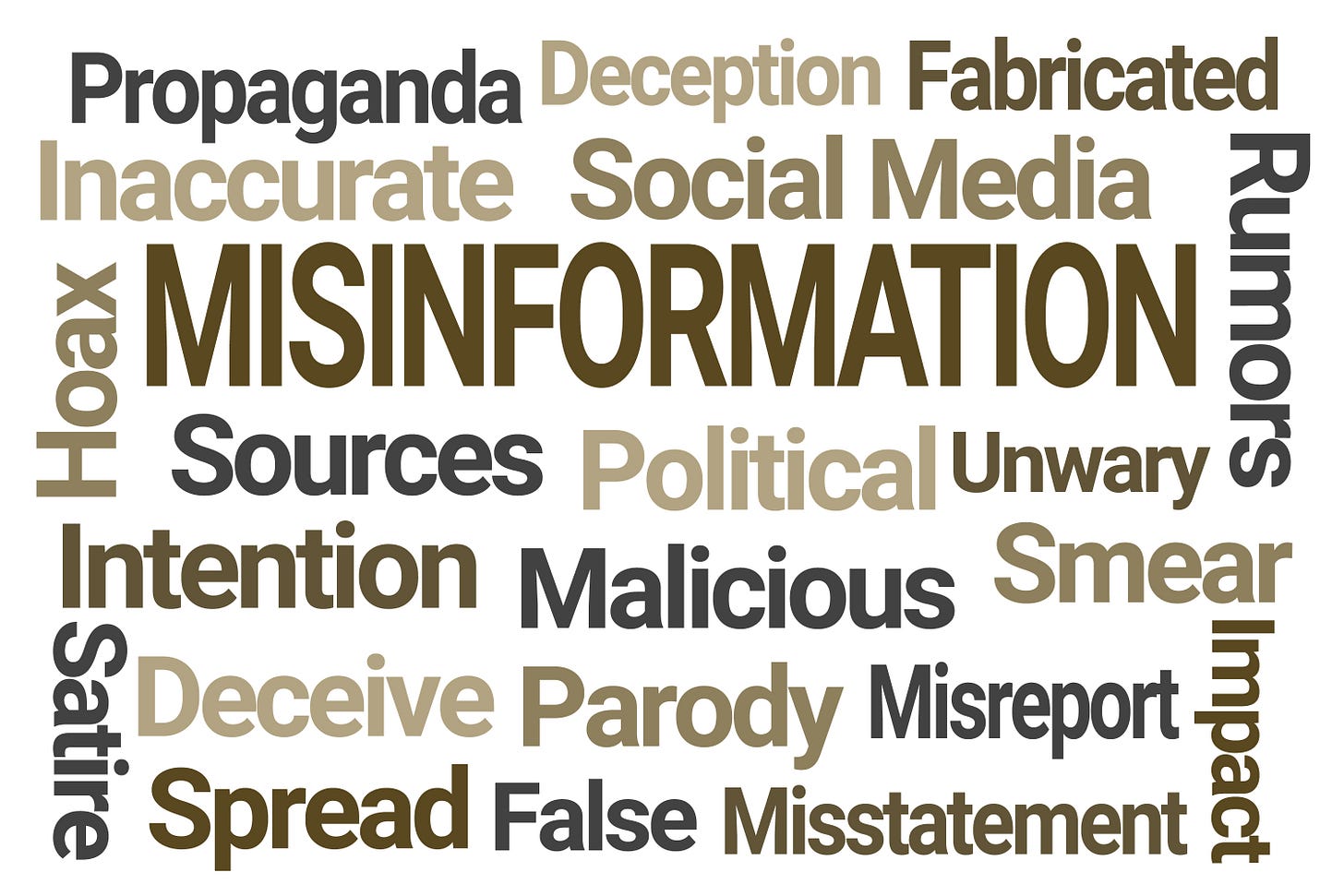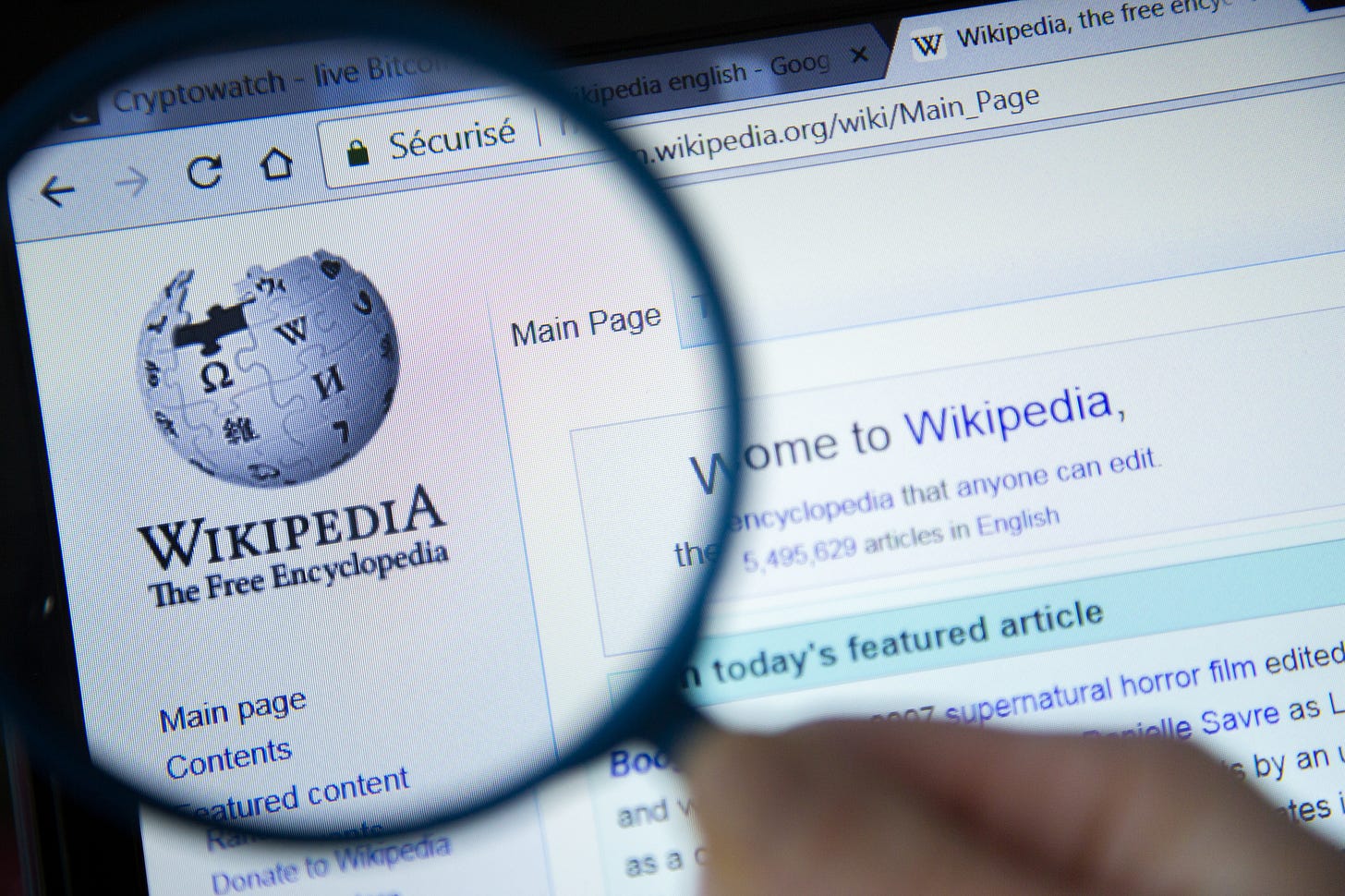E-Pluribus | July 20, 2021
Who has the power to define "misinformation," history education and memory laws, and Woke Wikipedia.
A round up of the latest and best writing and musings on the rise of illiberalism in the public discourse:
Michael Tracey: "Misinformation" Means Whatever Those With Censorship Power Want It To Mean
While not using the words “first they came for Alex Jones…,” Michael Tracey recalls as a cautionary tale the excommunication of Jones from many platforms in 2018, a move cheered on by many in more respectable media circles. Now that the Biden administration seems to be encouraging behind-the-scenes collaboration by social media companies to root out “misinformation” and ban its disseminators, Tracey reminds us that those with the power often control the definitions, and that includes “misinformation.”
[I]f you were under any illusion back in 2018 that this would ever stop with [Alex] Jones — a figure believed to be sufficiently repulsive that any punishment doled out to him would not have broader implications for the average internet user — well, it didn’t take long for proof of just how wrong you were. Journalists and others with influential platforms, particularly those who spend all day everyday on the internet and rely on it for their livelihood, at least in theory have a duty to demonstrate some semblance of foresight. Meaning, to consider issues of public interest that go beyond their short-term desire for political vengeance. They consistently fail in this task, or never even bother aspiring toward it in the first place. Because one thing the post 2016-era has shown is that they’re primarily concerned with their own exercise of power, and if their peers at the social media companies serve them as a reliable power conduit, that’s just dandy.
Please don’t even try to argue that Psaki’s dictum is somehow going to be limited to “misinformation” surrounding vaccines, and that’s fine because of the unique danger of vaccine-related misinformation in light of the Delta variant blah blah blah. There’s always going to be a situation deemed sufficiently “dangerous” by those in power to rationalize encroachments on free expression. Always some “emergency” — Islamic terrorism, white nationalist terrorism, a communicable disease, severe weather events, racist Academy Awards ceremonies, whatever. It will never end. Because those in power are extremely adept at finding rationalizations for the power they seek to exercise. I personally got the vaccine, and I would generally recommend that others do so. But I flatly reject the logical leap to “social media companies must therefore systematically purge users from the internet at the direct behest of the federal government.”
Read the whole thing.
ICYMI: Timothy Snyder: The War on History Is a War on Democracy
In a long piece in late June in New York Times Magazine, historian Timothy Snyder writes of the “memory laws” Soviet Russia used to reframe history to its own advantage. Snyder warns that legislation and guidelines passed by or under consideration in a number of states to narrowly define the content of US history education in schools are uncomfortably similar in effect if not intent to those Orwellian measures.
This spring, memory laws arrived in America. Republican state legislators proposed dozens of bills designed to guide and control American understanding of the past. As of this writing, five states (Idaho, Iowa, Tennessee, Texas and Oklahoma) have passed laws that direct and restrict discussions of history in classrooms. The Department of Education of a sixth (Florida) has passed guidelines with the same effect. Another 12 state legislatures are still considering memory laws.
The particulars of these laws vary. The Idaho law is the most Kafkaesque in its censorship: It affirms freedom of speech and then bans divisive speech. The Iowa law executes the same totalitarian pirouette. The Tennessee and Texas laws go furthest in specifying what teachers may and may not say. In Tennessee teachers must not teach that the rule of law is “a series of power relationships and struggles among racial or other groups.” Nor may they deny the preamble to the Declaration of Independence, words that Thomas Jefferson presumably never intended to be part of an American censorship law. The Idaho law mentions Critical Race Theory; the directive from the Florida school board bans it in classrooms. The Texas law forbids teachers from requiring students to understand the 1619 Project. It is a perverse goal: Teachers succeed if students do not understand something.
[…]
But the most common feature among the laws, and the one most familiar to a student of repressive memory laws elsewhere in the world, is their attention to feelings. Four of five of them, in almost identical language, proscribe any curricular activities that would give rise to “discomfort, guilt, anguish or any other form of psychological distress on account of the individual’s race or sex.”
History is not therapy, and discomfort is part of growing up. As a teacher, I cannot exclude the possibility, for example, that my non-Jewish students will feel psychological distress in learning how little the United States did for Jewish refugees in the 1930s. I know from my experience teaching the Holocaust that it often causes psychological discomfort for students to learn that Hitler admired Jim Crow and the myth of the Wild West. Teachers in high schools cannot exclude the possibility that the history of slavery, lynchings and voter suppression will make some non-Black students uncomfortable. The new memory laws invite teachers to self-censor, on the basis of what students might feel — or say they feel. The memory laws place censorial power in the hands of students and their parents. It is not exactly unusual for white people in America to express the view that they are being treated unfairly; now such an opinion could bring history classes to a halt.
The assumption is that psychological distress about race arises chiefly when the subject is raised. That might make sense from the perspective of a white person whose concern is not to be regarded as a racist, and who can conclude that the best way to avoid the risk of such discomfort is to keep the subject off the table. But what would it really take to remove “discomfort, guilt, anguish or any other form of psychological distress” on account of race from the lives of Black people, or from the school days of Black students? What would happen if African American students in a state with a memory law spoke up in class to say that teaching the story of the founding fathers without reference to their slaveholding caused discomfort and anguish to them specifically as Black people?
Read it all at the New York Times Magazine.
Ingrid Chung: Wikipedia Conforms to Wokeness
While the reputation of Wikipedia has often suffered by being seen by many as a repository of pooled ignorance, its accessibility, egalitarianism and non-elitist vibe have all gone a long way in making it an internet fixture. Ingrid Chung at National Review raises the possibility that the site is undergoing a transformation to a more conventional mainstream source based on the observations of one of the co-founders of the site.
Larry Sanger, co-founder of Wikipedia, recently spoke out on how he believes Wikipedia has become the mouthpiece of a “reliably establishment point of view” on socio-political issues as opposed to the collaborative “encyclopedia of opinion” he had envisioned it to be. As proof, he points to the fact that “you can’t cite Fox News on socio-political issues” on the site. He also believes that “a complex game [is] being played . . . to make the article say what somebody wants them to say.”
It is certainly startling to hear this enunciated by someone who founded the Internet encyclopedia. While this revelation is hardly surprising, it is concerning, and shows that Wikipedia is starting to resemble traditional academia, which has long been keen on forging and conforming to a particular orthodoxy even in fields such as history and sociology, the study of which would likely benefit from diversity of opinion and viewpoints. The idiom “the right side of history” is based on the presumption that history does eventually take a side, and that there is often a prevailing, establishment opinion that is considered “right” when historians evaluate a certain event or figure in history. Opposition to the establishment position is, almost invariably, eventually pushed out of the consciousness of academia.
[…]
[A]s Wikipedia expands in readership and influence, it seems to be following the trend set by traditional academia. The contention that any forum for free exchange of opinion on socio-political issues cannot survive expansion in scale and reputation may sound pessimistic. But when opinions on hotly contested issues collide and the incentives to use such a forum to broadcast a certain narrative grow, one side often prevails. It is unfortunate that, more often than not, the victors of such struggles of opinion are unwilling to share conquered ground with their opponents, whose views they would sometimes try to discredit or suppress to lend credence to their own narratives. This is not to suggest that those with center-left opinions, which constitute the prevailing “establishment,” are necessarily sinisterly motivated by selfishness in suppressing dissenting opinion. They may simply genuinely think that the opposition is wrong and does not deserve a platform for their erroneous view. Of course, some, such as Larry Sanger, detect more sinister motives.
However, regardless of their intentions, the repercussions of shrinking intellectual diversity are real. As John Stuart Mill argued, when we are left with only one set of opinion that is deemed acceptable, not only may we never know whether that narrative is in fact correct, but we may also no longer be incentivized to thoroughly understand that set of opinion and how it had come by. Hence, truth becomes more elusive.
Read it all here.
Around Twitter
Thread from Christopher Rufo on an apparent admission by critical race theorist Kimberlé Crenshaw on use of the term:
Follow up by James Lindsay:
Jesse Singal on the error-riddled so-called scientific coverage of the book “Irreversible Damage”:














